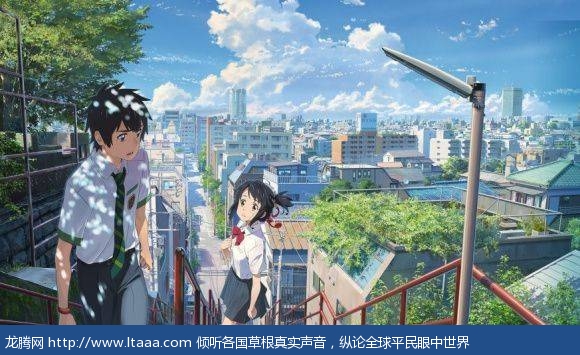《你的名字》成为在中国票房最高的日本电影 [日本媒体]
北京 - 电影“你的名字”在星期六成为中国历史票房最高的日本电影,年轻人涌向影院观看这个风靡一时的爱情故事,尽管两国之间的政治关系不和多年。日本网友:但今年可能反映了中国提升对日本的公众情绪的强烈意愿,允许在中国剧院上映的日本电影数量增加到11部,包括新海诚的动画。真的吗?怎么会这样呢?
-------------译者:卡思-审核者:龙腾翻译总管------------
BEIJING —Anime film “your name.” on Saturday became the highest-grossing Japanese movie of all time in China as young people flock to watch the blockbuster love story despite years of difficult political relations between the two countries.
北京 - 电影“你的名字”在星期六成为中国历史票房最高的日本电影,年轻人涌向影院观看这个风靡一时的爱情故事,尽管两国之间的政治关系不和多年。
Box office sales of the film topped the 530 million-yuan ($76.16 million) record set in 2015 by “Stand By Me Doraemon a 3-D animated film featuring a robotic cat character from a famous Japanese manga series according to data provided by China’s popular website for cinema tickets Maoyan.com.
根据中国热门的电影票房网站Maoyan.com(猫眼票房分析)提供的数据,该电影的票房打破了2015年“Stand By Me Doraemon(哆啦A梦:伴我同行)”-一个着名日本漫画系列的机器猫角色的3D动画片-创下的的5.3亿元人民币(7616万美元)的纪录。
The new all-time high was set quickly after the film directed by Makoto Shinkai premiered across China on Dec 2.
历史新高在新海诚执导的电影于12月2日在中国首映后迅速重新缔造。
-------------译者:卡思-审核者:龙腾翻译总管------------
Full of picturesque scenes the body-swapping fantasy involving two high school students living different lives in different places—a country girl who yearns for a life outside and a Tokyo boy—was first released in Japan in late August. Since then it has become a cultural sensation at home and abroad.
电影充满了奇特的身体交换幻想的场景,两个住在不同地方,过着不同生活的高中生 - 一个渴望外面生活的乡村女孩和一个东京男孩 - 在8月下旬在日本首次发布。从那以后,它已经成为国内外的文化轰动。
China approved the screening of Shinkai’s smash-hit at theaters with exceptionally fast speed at a time when Tokyo and Beijing are trying to repair bilateral ties.
中国在东京和北京正试图修复两国关系的时候,以极快的速度批准了影院放映这个来自新海诚的电影冲击。
China is the world’s second-largest cinema market after the United States. However the government limits the number of foreign films that can be distributed each year and tightly controls which movies are shown.
中国是世界仅次于北美的第二大电影市场。然而,政府限制了每年可以引进的外国电影的数量,并严格控制上映哪些电影。
-------------译者:卡思-审核者:龙腾翻译总管------------
HachidoriDEC. 19 2016 - 08:41AM JST
But this year possibly reflecting China’s strong will to improve public sentiment toward Japan the number of Japanese films allowed to be shown in Chinese theaters jumped to 11 including Shinkai’s animation.
Really? How?
但今年可能反映了中国提升对日本的公众情绪的强烈意愿,允许在中国剧院上映的日本电影数量增加到11部,包括新海诚的动画。
真的吗?怎么会这样呢?
Mirai HayashiDEC. 19 2016 - 10:41AM JST
Great movie!!
好电影!!
dcog9065DEC. 19 2016 - 12:22PM JST
Great to hear such positive news from the two countries
很高兴听到关于这两个国家之间的积极消息。
-------------译者:卡思-审核者:龙腾翻译总管------------
smithinjapanDEC. 19 2016 - 12:32PM JST
Hachidori: "Really? How?"
I've only ever heard politicians and their steeple with negative sentiment towards either country although it is certainly growing here. You're proof. You've taken a positive thing and chosen to insert petty politics much like people who depend on Chinese tourists -- people who come here willingly and because they like it -- then turn around and spit on them complaining about how they have flocked to "my favourite places" and suggesting they ought to leave (but leave their money when they do). The fact that the movie is No. 1 in China kind of proves that at the level of the public sentiment is somewhat different does it not? It's something to be happy about maybe even proud if you're Japanese or live here; not something to question or gripe about.
dcog: "Great to hear such positive news from the two countries"
Precisely!
Hachidori:真的吗?怎么会这样呢?
我只听到政客和他们的高层对两个国家都有负面情绪,虽然这种情绪肯定有在增长。你们就是是证明。你们对一些积极的事情选择插入小政治意味,很像某些人一边依赖中国游客 - 那些来到这里自由游玩,因为他们喜欢这的人 - 一边转过身来对他们吐唾沫,抱怨他们如何涌入“我最喜欢的地方“,并建议他们应该离开(但当他们离开他们的钱也随之离去)。这部电影是中国票房第一的事实证明,在公众情绪的层面上有些不同不是吗?如果你是日本人或住在这里,这应该是一件令人高兴的事,甚至可能感到自豪;而不是什么疑问或抱怨。
dcog:“很高兴听到这两个国家之间的积极消息”
没错!
-------------译者:卡思-审核者:龙腾翻译总管------------
Azrul HakimDEC. 19 2016 - 03:32PM JST
Love the movie!
超爱这部电影!
sandhonourDEC. 19 2016 - 05:50PM JST
I agree with smith in Japan we shouldn't be so critical that China likes this movie and likes Japan and Japanese products. It all contributes to the wealth of society here. Having said that this dislike of Chinese visiting countries and spending etc is a phenomena I have seen in HK and Singapore as well. Its a shame because if the Chinese stop spending it will effect us.
我同意史密斯的话,在日本我们想法不应该那么极端,中国人喜欢这部电影,喜欢日本和日本产品。这一切都有利于社会的财富。不过话说回来,我在香港和新加坡也看到那里的人们不喜欢中国人到访和花钱的现象。这可真遗憾,因为如果中国人停止消费就会影响到我们。
-------------译者:卡思-审核者:龙腾翻译总管------------
Shumatsu_SamuraiDEC. 19 2016 - 06:21PM JST
I've only ever heard politicians and their steeple with negative sentiment towards either country
Curious. Pew polling shows quite the opposite that Chinese people themselves do not like Japan.
http://www.pewglobal.org/2016/09/13/hostile-neighbors-china-vs-japan/
This used to be reported on very regularly as this has been a historical trend ever since I can remember them doing the polls so I'm surprised you've never heard about it.
我只听到政客和他们的高层对两个国家都有负面情绪。
这就奇怪了。皮尤的调查结果和你所说的刚好相反,中国人民也不喜欢日本哦。
http://www.pewglobal.org/2016/09/13/hostile-neighbors-china-vs-japan/
我记得他们家做这样的调查以来就一直是这样的趋势,我感到奇怪的是你竟然从来没听说过。
版权声明
我们致力于传递世界各地老百姓最真实、最直接、最详尽的对中国的看法
【版权与免责声明】如发现内容存在版权问题,烦请提供相关信息发邮件,
我们将及时沟通与处理。本站内容除非来源注明五毛网,否则均为网友转载,涉及言论、版权与本站无关。
本文仅代表作者观点,不代表本站立场。
本文来自网络,如有侵权及时联系本网站。
图文文章RECOMMEND
热门文章HOT NEWS
-
1
最近,新冠肺炎疫情在日本有扩大的趋势,有专家呼吁日本应当举国行动起来,共...
- 2
- 3
- 4
- 5
- 6
- 7
- 8
- 9
- 10
推荐文章HOT NEWS
-
1
最近,新冠肺炎疫情在日本有扩大的趋势,有专家呼吁日本应当举国行动起来,共...
- 2
- 3
- 4
- 5
- 6
- 7
- 8
- 9
- 10











